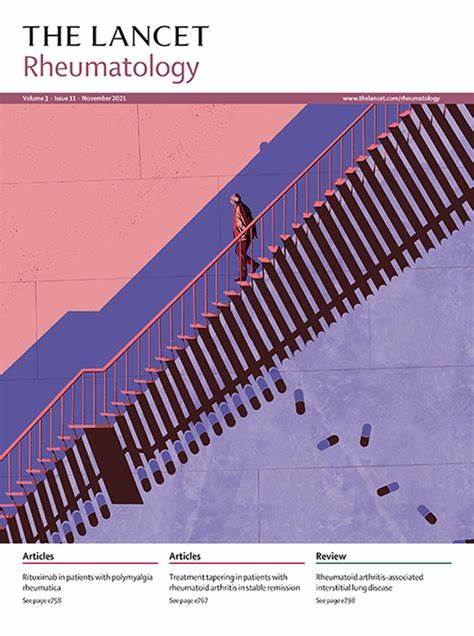Baricitinib in early polymyalgia rheumatica (BACHELOR): a randomised, double-blind, placebo-controlled, parallel-group trial
IF 15
1区 医学
Q1 RHEUMATOLOGY
引用次数: 0
Abstract
Background
Moderate doses of glucocorticoids result in improvements in nearly all patients with polymyalgia rheumatica, but related adverse events are common in older individuals. We aimed to evaluate whether treatment with baricitinib (a Janus kinase 1/2 inhibitor) results in disease control without the use of oral glucocorticoids in people with recent-onset polymyalgia rheumatica.
Methods
We conducted a randomised, double-blind, placebo-controlled, parallel-group trial at six expert centres in France. Participants with recent (<6 months) polymyalgia rheumatica naive to glucocorticoids and a C-reactive protein polymyalgia rheumatica activity score (CRP PMR-AS) of more than 17 were randomly assigned (1:1), with stratification by hospital, to receive either 4 mg baricitinib orally or placebo (with oral glucocorticoids as rescue treatment in the event of high disease activity) for 12 weeks, followed by 2 mg baricitinib or placebo for another 12 weeks. Subdeltoid glucocorticoid injections at week 1 and week 4 were permitted. Participants, investigators, outcome assessors, and sponsor personnel were masked to group assignments. The primary outcome was a CRP PMR-AS of 10 or less at week 12 without oral glucocorticoid use from week 1 to week 12, analysed in all randomly assigned participants who did not withdraw before first treatment administration. Participants were followed up for 36 weeks. An individual with lived experience of polymyalgia rheumatica was involved in the study design. The trial was registered on ClinicalTrials.gov, NCT04027101, and is complete.
Findings
We assessed 39 individuals for eligibility between Dec 1, 2020, and Aug 30, 2023. 34 participants (22 women and 12 men) were randomly assigned; 18 participants were assigned to the baricitinib group and 16 participants were assigned to the placebo group. One person allocated to placebo withdrew before the first infusion and was not included in analyses. The primary endpoint was reached at week 12 by 14 (78%) of 18 participants in the baricitinib group and two (13%) of 15 participants in the placebo group (relative risk 5·8, 95% CI 3·2–10·6; crude p=0·0004; adjusted p<0·0001). The most common adverse events were musculoskeletal and connective tissue disorders (13 [72%] of 18 participants in the baricitinib group and four [25%] of 16 in the placebo group. There were no deaths and no major adverse cardiovascular events in either study group.
Interpretation
This study suggests that, compared with placebo, individuals with polymyalgia rheumatica receiving 4 mg baricitinib are less likely to need oral glucocorticoids to have low disease activity at week 12 of treatment without any new safety signals.
Funding
CHU Brest and Eli Lilly.
Baricitinib治疗早期风湿性多肌痛(BACHELOR):一项随机、双盲、安慰剂对照、平行组试验。
背景:中等剂量的糖皮质激素几乎可以改善所有风湿性多肌痛患者,但相关不良事件在老年人中很常见。我们的目的是评估在不使用口服糖皮质激素的情况下,baricitinib(一种Janus激酶1/2抑制剂)治疗是否能控制新近发病的多肌痛风湿病患者的疾病。方法:我们在法国的六个专家中心进行了一项随机、双盲、安慰剂对照、平行组试验。近期发现的参与者:我们在2020年12月1日至2023年8月30日期间评估了39人的资格。34名参与者(22名女性和12名男性)被随机分配;18名参与者被分配到巴西替尼组,16名参与者被分配到安慰剂组。分配到安慰剂组的一名患者在第一次输注前退出,未纳入分析。巴西替尼组18名受试者中有14名(78%)在第12周达到主要终点,安慰剂组15名受试者中有2名(13%)达到主要终点(相对风险5.8,95% CI 3.2 - 10.6;原油p = 0·0004;解释:该研究表明,与安慰剂相比,接受4mg巴西替尼治疗的风湿性多肌痛患者在治疗第12周时不太可能需要口服糖皮质激素来降低疾病活动性,且没有任何新的安全性信号。资助:CHU Brest和Eli Lilly。
本文章由计算机程序翻译,如有差异,请以英文原文为准。
求助全文
约1分钟内获得全文
求助全文
来源期刊

Lancet Rheumatology
RHEUMATOLOGY-
CiteScore
34.70
自引率
3.10%
发文量
279
期刊介绍:
The Lancet Rheumatology, an independent journal, is dedicated to publishing content relevant to rheumatology specialists worldwide. It focuses on studies that advance clinical practice, challenge existing norms, and advocate for changes in health policy. The journal covers clinical research, particularly clinical trials, expert reviews, and thought-provoking commentary on the diagnosis, classification, management, and prevention of rheumatic diseases, including arthritis, musculoskeletal disorders, connective tissue diseases, and immune system disorders. Additionally, it publishes high-quality translational studies supported by robust clinical data, prioritizing those that identify potential new therapeutic targets, advance precision medicine efforts, or directly contribute to future clinical trials.
With its strong clinical orientation, The Lancet Rheumatology serves as an independent voice for the rheumatology community, advocating strongly for the enhancement of patients' lives affected by rheumatic diseases worldwide.
 求助内容:
求助内容: 应助结果提醒方式:
应助结果提醒方式:


